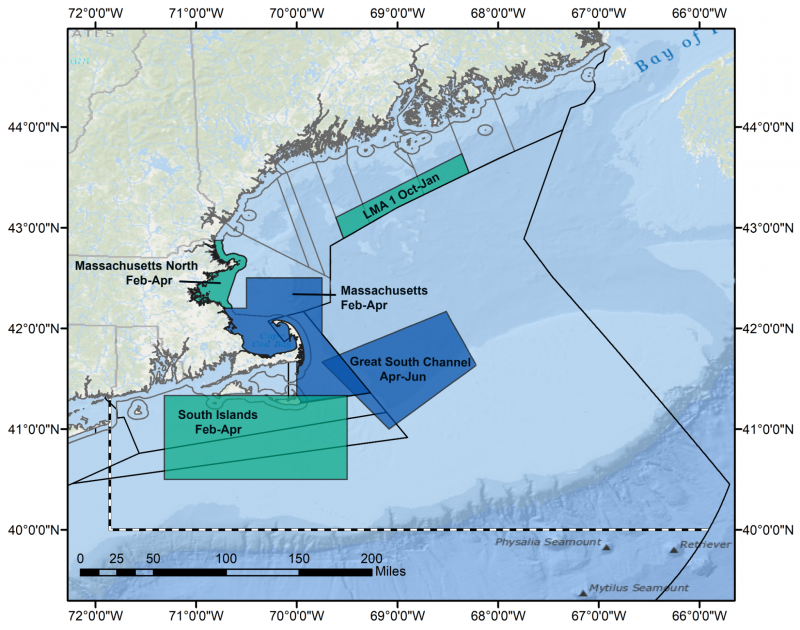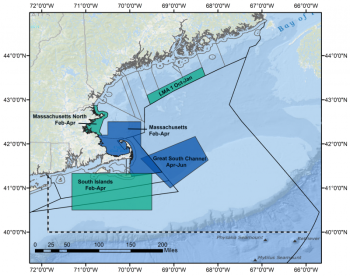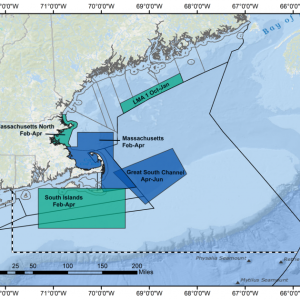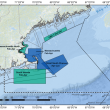Maine Lobstermen’s Assoc. files suit against feds over Right Whale conservation plan
 “One of the methods for reducing the number of buoy lines when and where right whales are present is to extend the boundaries of one seasonal buoy line closure area, and implement two new areas where vessel operators are prohibited from fishing for lobster or Jonah crab with traps or pots using buoy lines to mark the ends of trawls and retrieve gear,” said NOAA Fisheries. “However, they would be able to fish in these areas using ropeless trap or pot gear. Two existing seasonal restricted areas are also modified to allow fishing without buoy lines.”
“One of the methods for reducing the number of buoy lines when and where right whales are present is to extend the boundaries of one seasonal buoy line closure area, and implement two new areas where vessel operators are prohibited from fishing for lobster or Jonah crab with traps or pots using buoy lines to mark the ends of trawls and retrieve gear,” said NOAA Fisheries. “However, they would be able to fish in these areas using ropeless trap or pot gear. Two existing seasonal restricted areas are also modified to allow fishing without buoy lines.”
 “One of the methods for reducing the number of buoy lines when and where right whales are present is to extend the boundaries of one seasonal buoy line closure area, and implement two new areas where vessel operators are prohibited from fishing for lobster or Jonah crab with traps or pots using buoy lines to mark the ends of trawls and retrieve gear,” said NOAA Fisheries. “However, they would be able to fish in these areas using ropeless trap or pot gear. Two existing seasonal restricted areas are also modified to allow fishing without buoy lines.”
“One of the methods for reducing the number of buoy lines when and where right whales are present is to extend the boundaries of one seasonal buoy line closure area, and implement two new areas where vessel operators are prohibited from fishing for lobster or Jonah crab with traps or pots using buoy lines to mark the ends of trawls and retrieve gear,” said NOAA Fisheries. “However, they would be able to fish in these areas using ropeless trap or pot gear. Two existing seasonal restricted areas are also modified to allow fishing without buoy lines.”
WASHINGTON, D.C. — The Maine Lobstermen’s Association, the oldest and largest fishing industry association on the East Coast established in 1954, has filed suit against the National Marine Fisheries Service, saying the newly enacted federal plan to protect Right Whales in the Gulf of Maine is draconian and flawed, and will demolish Maine’s lobster fishery.
The MLA asserts that NMFS’s new Biological Opinion, released in May, is unlawful because NMFS acted arbitrarily by, among other reasons, failing to rely on the best scientific information and failing to account for the positive impact of conservation measures already adopted by the Maine lobster fishery. The complaint also asks for relief from the new whale rule arising from flaws in the Biological Opinion released in September.
The suit was filed in U.S. District Court for the District of Columbia, in Washington, D.C., Sept. 27. (See attached PDF for the complaint)
“NMFS got it wrong,” Patrice McCarron, executive director of the Maine Lobstermen’s Association, in a news release. “The science does not support the agency’s plan. Using worst case scenarios that hold Maine lobstermen accountable for right whale deaths occurring in Canada won’t help protect right whales, but it will decimate Maine’s lobster industry.”
The same day the suit was filed, the Maine Gov. Janet Mills administration was granted intervenor status in another, and older, lobster industry case that was also filed in U.S. District Court in Washington, D.C.
That case, Center for Biological Diversity v. Ross, contests the Federal government’s recently published regulation to protect North Atlantic Right Whales. It also amends and supplements a 2018 lawsuit which challenged the Federal government’s authority to regulate the lobster fishery by challenging the required Biological Opinion.
“A court decision in the plaintiff’s favor could close Maine’s lobster fishery altogether – a completely unacceptable outcome that would be devastating to our lobstermen and their families and devastating to our coastal communities and our economy,” said Mills, in a Sept. 27 news release. “We will fight tooth and nail to prevent that from happening.”
The Mills Administration contracted with the law firm Nossaman LLP to represent the State of Maine as an intervenor in this lawsuit. Nossaman is based in California and has an office in D.C.
Funding for this “specialized outside counsel” comes via the Governor’s Contingent Account.
Last week, Gov.Mills sent a letter Secretary of Commerce Gina Raimondo urging swift action by NOAA Fisheries to reduce the unnecessary economic harm to Maine fishermen that the recently announced Federal whale protection rule will cause.
Raimondo, along with the National Marine Fisheries and Janet Cait, Assistant Administrator for Fisheries, National Marine Fisheries Service, were named as defendants in the Maine Lobstermen’s Assoc. suit.
The suit also asks for relief from the new whale rule arising from flaws in the Biological Opinion released in September.
At the end of August, Maine’s Congressional Delegation had also expressed dismay of the new rules published Aug. 31. The Dept. of Commerce issued the new rules in the federal register, entitled: Taking of Marine Mammals Incidental to Commercial Fishing Operations; Atlantic Large Whale Take Reduction Plan Regulations; Atlantic Coastal Fisheries Cooperative Management Act Provisions; American Lobster Fishery.
In those new rules, a portion of Maine’s waters are closed to setting lobster traps from October through January in an attempt to reduce mortality of Right Whales migrating though the Gulf of Maine.
The rules also call for the, “reduction of the number of buoy lines (lines that link the fisherman’s floating surface buoy to the pot or trap) in the water; weaken the remaining lines so that whales can break free before becoming seriously injured; improve how fishing gear is marked so NOAA Fisheries and partners can better identify the type of fishing gear associated with entanglements when they do occur, thereby informing future risk reduction measures,” according to NOAA.
The Maine Lobstermen’s Association claims, however, that the National Marine Fisheries has ignored science and evidence submitted by the Association, “and other experts that would have enabled the agency to correct its mistakes,” the MLA said.
“The MLA points to the undeniable success of the Maine lobster fishery’s existing right whale conservation measures implemented over the last 20 years,” in its statement. “There has never been a known right whale serious injury or mortality associated with Maine lobster gear. Moreover, there has not been a single known right whale entanglement with Maine lobster gear in almost two decades.”
Instead, Maine lobstermen ask why the federal government is not taking on Canada and the shipping industry.
“NMFS is targeting Maine lobstermen because it is easy. We’re a bunch of small, owner‐ operated businesses. Taking on Canada and the shipping industry is hard,” said Cutler lobsterman Kristan Porter, president of the MLA. “Maine lobstermen understand the need to protect right whales, but if NMFS really wants to save right whales, they should be going after the things we know are actually killing them rather than dismantling our fishery piece by piece.”
According to the MLA’s complaint, “NMFS’s mandate ignores the reality that the Maine lobster fishery already has an extremely low incidence of interactions with right whales due, in part, to a suite of mitigation measures that have been implemented for many years. Reducing its already low impact by another 98% is not possible without driving most of Maine’s harvesters out of business permanently.” It continues that NMFS disregards “critically important new scientific information about right whale migration patterns [that] shows that the Maine lobster fishery will continue to pose very little risk to North Atlantic right whales.”
The 10‐year whale plan is already forcing unnecessary burdens on the fleet and will ultimately result in devastating economic hardship to Maine’s fleet of 4,800 individually owned and operated lobster fishing vessels and the tens of thousands of jobs they support, all of which are essential to Maine’s economy as well as irreplaceable aspects of the State’s coastal and maritime heritage, the MLA said.
In addition to filing the lawsuit, the MLA also remains an active intervenor in CBD v. Ross, an ongoing case in the U.S. District Court for the District of Columbia. In that case, a consortium of environmental advocacy groups recently filed an amended complaint arguing that NMFS’s 10‐ year plan and new whale rule need to be made even more stringent.
In 2020, over $405 million worth of lobster was caught off the coast of Maine, said the MLA.
The MLA established a Legal Defense Fund to support MLA’s efforts to save Maine’s lobster fishery through engagement in aggressive legal and policy strategies, ensuring decisions are based on sound science, innovating effective conservation strategies, and communication.
The MLA is asking the court to declare that the defendants, in issuing the 2021 BiOp, including the Conservation Framework, and the TRP Rule, violated the ESA and APA by substantially overestimating the effects of the American Lobster Fishery, including the Maine lobster fishery, on the North Atlantic right whale and by imposing unnecessary and inappropriate conservation targets and restrictions on the Maine lobster fishery;
Event Date
Address
United States



























